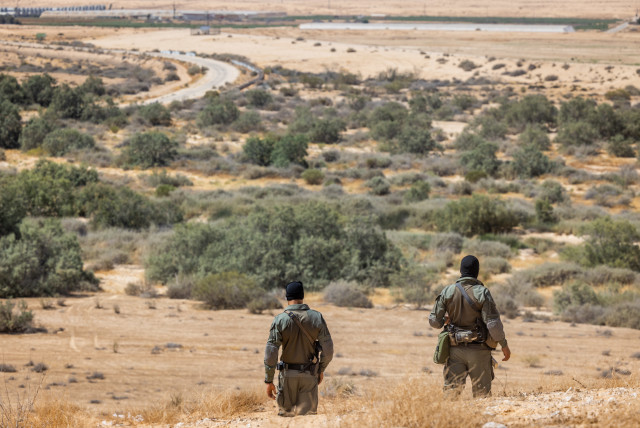Israel-Egypt border mess-up was tactical, not strategic - analysis

There are indications that the Egyptian police officer was quietly a radical jihadist who was using his position to stage a terror attack, meaning this was likely a fluke.
Last week, the IDF celebrated a drug bust in which it nabbed NIS 300,000 ($80,000) of drugs that criminals were trying to smuggle from Egypt into Israel.
This would go along with 70 full-fledged busts in 2022 that led to the seizure of NIS 160 million ($42.7 m.) worth of drugs, including a massive bust of NIS 50 m. ($13.4 m.) in February.
All of that has been forgotten after this past weekend’s incident in which an Egyptian police officer killed three IDF soldiers.
The biggest question arising from the incident, though there are many, is whether the IDF failure during this episode was tactical, and mostly limited to the unusual particular circumstances, or strategic, exposing a much greater threat that has been ignored until now.
Despite how shocked the country was that the quiet prevailing for 45 years over its border with Cairo was suddenly shattered, so far the clear signals are that the problems here were tactical and not strategic.
The details that have come out so far include that there was a small border opening which was poorly secured, but that was done on purpose to make it easier for IDF forces or maintenance workers to quickly get through to complete a short and specific mission.
Also, the soldiers on guard duty had shifts that were too long and they may not have been protected enough from someone seeking to attack them.
But policy is made for the most frequent cases, not just for exceptional ones.
There is tons of smuggling on the Egypt-Israeli border. The 70 busts in 2022 were just the tip of the iceberg.
According to the IDF, it thwarted more than 500 incidents of attempted smuggling last year.
This means that the IDF does not catch the smugglers at least 85% of the time.
Rather, maybe it shines a light on them, fires some shots or starts sending troops or vehicles toward them and the smugglers run away.
Of course, it is possible that even those 500 incidents are only a piece of the action and that there are many more times where smugglers get through the long border without the IDF noticing anything.
One of the things in common with all of these common scenarios is that the smugglers are not looking to engage the military but want to avoid it.
So normal smugglers are not going to try to kill IDF troops.
The Egyptian border attack was a fluke
So far, there are indications that the Egyptian police officer was quietly a radical jihadist who was using his position to stage a terror attack or maybe was trying to perpetrate both smuggling and some killing.
The point is that, at least to date, the attacker was a fluke – a statistical anomaly.
It certainly is possible that following his “success” he may inspire copycats.
In that sense, for the next several months, it may make sense for the IDF to increase its border presence and improve its security and safety procedures on a temporary basis to head off any attempt to turn this one-time “success” into a wave.
However, what is most likely is that some weeks or months from now, nothing will have changed much, there will have not been many violent copycats, and Israel’s other borders – which really are still far more dangerous – will need most of the resources as usual.
Sure, the IDF could decide to invest more at a strategic level to crack down on the smuggling even more than it already has.
But how long will that last?
Smuggling is surely not one of the country’s top national security threats – and is certainly not the glory role of the army .
Not long ago, a video went viral in which Israeli female and Egyptian troops who were bored of staring at each other both did a dance-off.
The viral video showed how peaceful and cooperative the Israeli and Egyptian border guards were.
In February, IDF Lt.-Col. Eyal Levi told The Jerusalem Post that cooperation with the Egyptian military was phenomenal and constant.
Especially with so many larger threats, It will take many more such tragic incidents before the IDF decides to treat the Egyptian border as being strategically dangerous for any sustained period.
Jerusalem Post Store
`; document.getElementById("linkPremium").innerHTML = cont; var divWithLink = document.getElementById("premium-link"); if (divWithLink !== null && divWithLink !== 'undefined') { divWithLink.style.border = "solid 1px #cb0f3e"; divWithLink.style.textAlign = "center"; divWithLink.style.marginBottom = "15px"; divWithLink.style.marginTop = "15px"; divWithLink.style.width = "100%"; divWithLink.style.backgroundColor = "#122952"; divWithLink.style.color = "#ffffff"; divWithLink.style.lineHeight = "1.5"; } } (function (v, i) { });

